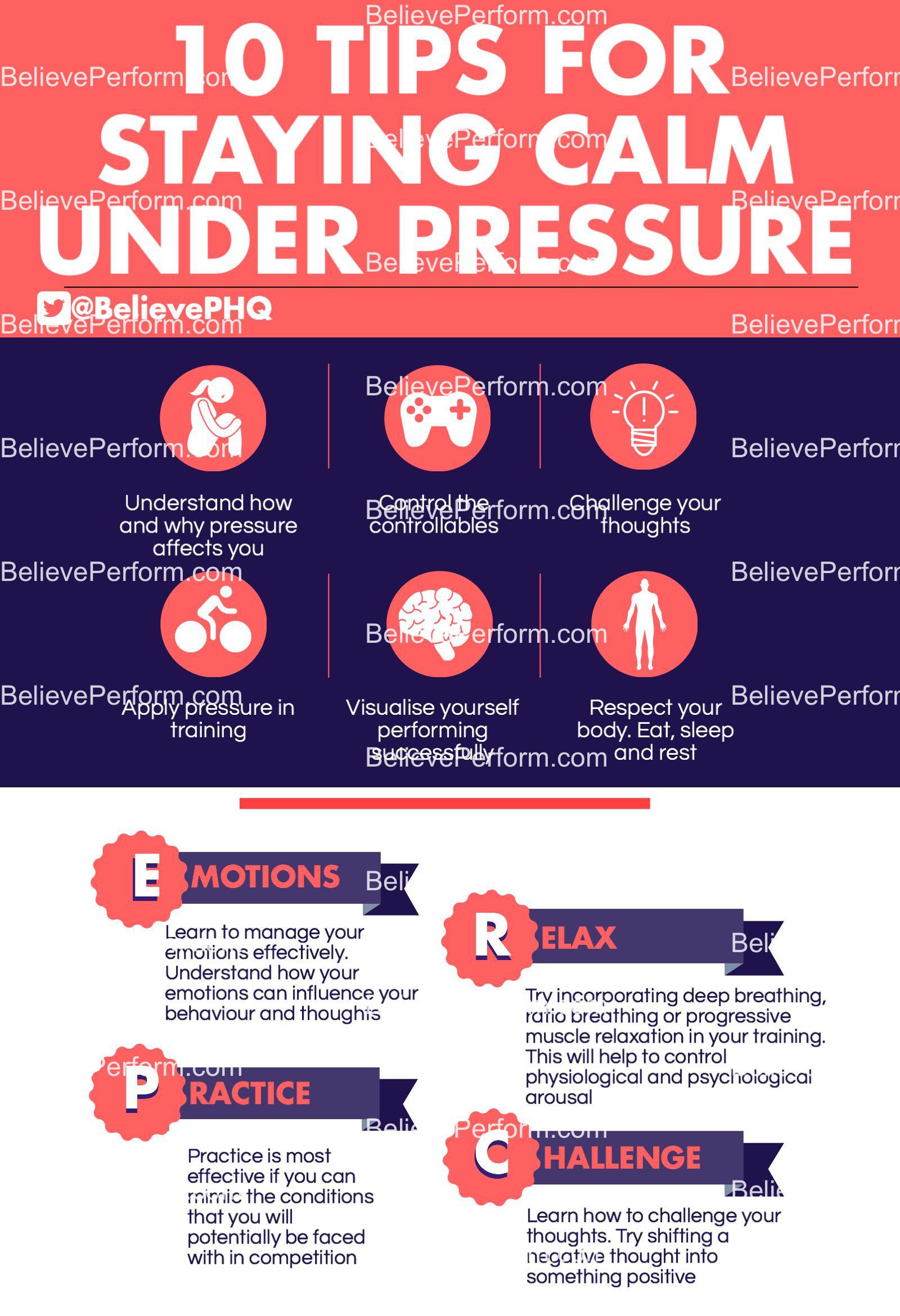How To Stay Calm Under Pressure At Work
To stay calm under pressure at work, focus on deep breathing and prioritize tasks effectively. In a fast-paced work environment, it is crucial to have a calm and composed demeanor to ensure productivity and avoid burnout.
By implementing simple techniques such as taking deep breaths, organizing tasks, and practicing mindfulness, you can maintain a sense of calmness even when faced with stressful situations. This not only improves your decision-making abilities but also enhances your overall performance and promotes a healthier work-life balance.
Incorporating these strategies into your daily routine will help you stay centered, focused, and productive in the midst of high-pressure situations at work.

Credit: www.cakeresume.com
Recognizing The Signs Of Stress
Recognizing the signs of stress is crucial for staying calm under pressure at work. By understanding the warning signals and implementing effective coping strategies, individuals can better manage stress and maintain a state of calmness even during challenging work situations.
Stress in the workplace is a common issue that can affect our mental and physical well-being. It’s important to be able to recognize the signs of stress so that we can take the necessary steps to manage it and stay calm under pressure. By being aware of these signs, we can make proactive efforts to reduce stress and increase our overall productivity. Let’s explore the physical and emotional symptoms that may indicate we are under stress at work.
Physical Symptoms
When we are stressed, our bodies often respond with various physical symptoms. These symptoms can manifest differently for each individual but commonly include:
- Headaches, migraines
- Digestive issues such as stomach pain, diarrhea, or constipation
- Difficulty sleeping or experiencing insomnia
- Frequent fatigue or feeling constantly tired
- Increase or decrease in appetite
- Escalation in heart rate
Being mindful of these physical manifestations can help us identify stress triggers and take appropriate steps to address them.
Emotional Symptoms
Alongside physical symptoms, stress can also give rise to emotional symptoms. These can be easily overlooked but can have a significant impact on our overall well-being. Common emotional symptoms of stress can include:
- Feeling overwhelmed or anxious
- Difficulty concentrating or making decisions
- Irritability, mood swings, or increased emotional sensitivity
- Depression or feelings of sadness
- Lack of motivation or interest in work
Recognizing these emotional signs allows us to acknowledge the existence of stress and take necessary measures to regain control.
Building A Solid Self-care Routine
Discover the secrets to building a solid self-care routine and learn how to stay calm under pressure at work. With practical tips and techniques, you can improve your well-being and maintain your composure in stressful work situations.
Building a Solid Self-Care Routine Maintaining a Healthy Lifestyle: Living a healthy lifestyle is crucial in staying calm under pressure at work. Eating nutritious meals, exercising regularly, and getting enough sleep can significantly impact your ability to handle stress. When it comes to meals, focus on incorporating a balanced mix of lean proteins, whole grains, and fruits and vegetables. Regular exercise, such as walking or yoga, can help release endorphins and reduce anxiety. Finally, prioritize sleep by establishing a consistent bedtime routine and ensuring you get the recommended 7-9 hours of rest each night. Practicing Mindfulness: Mindfulness is a powerful tool for managing stress in the workplace. By practicing mindfulness, you can stay centered and better navigate high-pressure situations. Simple activities, such as deep breathing exercises and meditation, can help calm the mind and increase focus. Additionally, taking regular breaks throughout the day to check in with yourself and engage in mindful activities, like going for a walk or listening to calming music, can refresh your mind and promote a sense of balance. Creating a Supportive Network: Surrounding yourself with a supportive network of friends, family, and colleagues can greatly contribute to your ability to stay calm under pressure. Reach out and connect with those who understand your challenges and can offer guidance and encouragement. Building strong relationships at work can also foster a positive work environment and help alleviate stress. Additionally, consider seeking the expertise of a mentor or coach who can provide guidance and perspective when faced with challenging situations. Setting Boundaries: Establishing clear boundaries between work and personal life is vital for maintaining a solid self-care routine. Avoid bringing work-related stress home by creating a designated workspace and adhering to specific work hours. Prioritize self-care activities, such as hobbies, spending time with loved ones, and engaging in activities that bring joy and relaxation. By setting boundaries, you allow yourself the space and time to recharge and return to work feeling refreshed and focused. Incorporating these self-care practices into your daily routine can help you stay calm and collected under pressure at work. By maintaining a healthy lifestyle, practicing mindfulness, building a supportive network, and setting boundaries, you can create a solid foundation for your well-being and effectively manage stress. Remember, investing time and effort into self-care is essential for maintaining a healthy work-life balance and thriving in your professional life.Developing Effective Coping Mechanisms
Discover effective coping mechanisms to stay calm under pressure at work. Learn techniques to manage stress and maintain productivity in a demanding work environment.
Developing Effective Coping Mechanisms: When faced with pressure at work, it’s crucial to have effective coping mechanisms to stay calm and composed. Developing these coping mechanisms can help you navigate through challenging situations and maintain a clear and focused mind. Two key strategies to develop these coping mechanisms are deep breathing techniques and positive self-talk.Deep Breathing Techniques:
One of the most powerful ways to stay calm under pressure is by using deep breathing techniques. Deep breathing activates the body’s relaxation response, reducing stress and anxiety. To practice deep breathing, follow these simple steps:- Find a quiet and comfortable place: Sit in a position that allows you to relax and unwind. Close your eyes if it helps you to focus better.
- Inhale deeply through your nose: Take a slow and deep breath, allowing your abdomen to expand fully.
- Exhale slowly through your mouth: As you release your breath, feel the tension and stress leaving your body.
- Repeat for several cycles: Continue this deep breathing pattern for a few minutes, or until you notice a sense of calmness.
Positive Self-talk:
Another effective coping mechanism is practicing positive self-talk. The way we talk to ourselves during high-pressure situations greatly impacts our ability to stay calm and focused. Positive self-talk involves replacing negative thoughts with affirmations and constructive statements. Here are some techniques to incorporate positive self-talk into your routine:- Affirmations: Repeat positive statements that uplift and encourage you. For example, “I am capable and confident in handling any challenges that come my way.”
- Challenge negative thoughts: Identify and challenge negative thoughts by looking for evidence to prove them wrong. Replace them with positive alternatives.
- Visualize success: Imagine yourself successfully overcoming the situation at hand. Visualize yourself staying calm, confident, and in control.
Effective Time Management Strategies
One of the keys to staying calm under pressure at work is effective time management. When you feel overwhelmed and stressed, having a solid plan and clear priorities can help you regain control and maintain focus. In this blog post, we will explore two essential time management strategies that can help you stay calm and organized in the face of pressure: setting priorities and creating realistic schedules.
Setting Priorities
Setting priorities allows you to identify and focus on the most important tasks at hand. By determining what needs to be done first, you can avoid feeling overwhelmed and ensure that you are making progress on your most important responsibilities. Here are a few tips to help you set priorities:
- Identify the urgency and importance of each task.
- Focus on tasks that align with your long-term goals.
- Break larger projects into smaller, more manageable tasks.
- Delegate tasks that can be handled by others.
Creating Realistic Schedules
In addition to setting priorities, creating realistic schedules is crucial for effective time management. It’s important to allocate an appropriate amount of time for each task, considering your available resources and deadlines. Here are some strategies to help you create realistic schedules:
- Estimate the time required for each task, considering potential interruptions or unforeseen delays.
- Allocate extra time for contingencies and unexpected issues that may arise.
- Set achievable deadlines that account for your workload and available resources.
- Prioritize focus and concentration during scheduled work periods.
By setting priorities and creating realistic schedules, you can manage your time effectively and stay calm under pressure at work. These strategies will help you regain control, reduce stress, and increase productivity. Remember, effective time management is a skill that can be developed with practice. Start implementing these strategies today and experience the benefits of staying calm and organized in any work situation.
Seeking Support And Feedback
When faced with pressure at work, one effective way to stay calm is by seeking support and feedback from those around you. Reaching out to colleagues and working with a mentor can provide valuable insights, guidance, and encouragement. This section will explore the benefits of both these approaches and how they can help you maintain composure in challenging situations.
Reaching Out To Colleagues
Connecting with your colleagues during times of pressure can be immensely beneficial. Your colleagues can offer different perspectives, share their experiences, and provide emotional support. By creating a supportive network within your workplace, you can exchange ideas and strategies for handling stress effectively.
Some ways you can seek support from your colleagues include:
- Initiating open conversations: Engage in open and honest discussions with your colleagues about the challenges you’re facing. By sharing your concerns, you may find that others have encountered similar situations and can offer valuable advice.
- Collaborating on projects: Working together on projects can help alleviate pressure. By dividing tasks and sharing responsibilities, you can reduce the burden and achieve better outcomes collectively.
- Seek feedback: Request feedback from your colleagues on your work. Their input can help you improve your skills and boost your confidence, making it easier to handle pressure situations.
Working With A Mentor
Having a mentor in your professional journey can be a game-changer when it comes to staying calm under pressure. A mentor provides guidance, acts as a sounding board, and offers support during challenging times. Their experience and expertise can help you navigate difficult situations while maintaining composure.
If you are looking for a mentor, consider the following:
- Identifying a mentor: Look for someone in your organization who has the experience and skills you admire. Reach out to them and express your desire to learn from their expertise.
- Establishing regular communication: Schedule regular meetings or check-ins with your mentor to discuss your progress and seek advice. These sessions can provide reassurance and a safe space to discuss any pressure-related concerns.
- Learning from their experiences: Take opportunities to learn from your mentor’s experiences. Ask questions, seek their insights, and apply their advice in your own work.
Remember, seeking support and feedback from colleagues and mentors is not a sign of weakness, but rather a smart approach to managing pressure at work. By tapping into the knowledge and support of those around you, you can better equip yourself to handle stress and maintain a calm mindset.

Credit: members.believeperform.com

Credit: www.grottonetwork.com
Frequently Asked Questions For How To Stay Calm Under Pressure At Work
How Can I Stay Calm Under Pressure At Work?
To stay calm under pressure at work, practice stress-management techniques such as deep breathing and prioritizing tasks.
What Are Some Effective Strategies For Managing Work-related Stress?
Effective strategies for managing work-related stress include setting boundaries, taking breaks, and seeking support from colleagues or mentors.
How Does Self-care Help In Staying Calm During Stressful Work Situations?
Self-care helps in staying calm during stressful work situations by promoting physical and mental well-being, enhancing resilience, and reducing the negative impact of stress.
Conclusion
In the fast-paced world of work, it’s crucial to stay calm under pressure. By implementing some simple strategies, such as deep breathing, prioritizing tasks, and seeking support, you can maintain your composure and achieve success even in the most challenging situations.
Remember, staying calm allows you to think clearly and make better decisions. So, take a moment to step back, take a breath, and stay calm amidst the chaos of the workplace.



